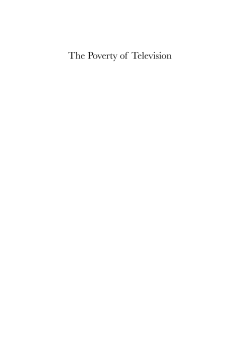
Additional Information
Book Details
Abstract
Based on a 20-month ethnographic study of television and audiences in class-divided Philippines, this is the first book to take a bottom-up approach in considering how people respond to images and narratives of suffering and poverty on television. The book aims to contribute to the broader project of de-Westernizing media studies and explore the tension between ethical prescription and anthropological description in the social sciences and humanities. Winner of the 2016 Philippine Social Science Council Excellence in Research Award.
‘This is the first scholarly book on Philippine television. Ong goes to the core of the issue – the cultural politics of news and entertainment, the lifeline of poverty of and in Philippine television. Ethnographic and political economic, the morality of media and development are critically engaged in this book.’ —Roland B. Tolentino, University of the Philippines College of Mass Communication
Jonathan Corpus Ong is a lecturer in the Department of Media and Communication at the University of Leicester.
‘This is the first scholarly book on Philippine television. Ong goes to the core of the issue – the cultural politics of news and entertainment, the lifeline of poverty of and in Philippine television. Ethnographic and political economic, the morality of media and development are critically engaged in this book.’ —Roland B. Tolentino, University of the Philippines College of Mass Communication
‘This thoughtful and rigorous examination of lay moralities among Filipinos watching images of the poor in their own country not only de-Westernizes the notion of “media witnessing”, but also calls on media studies writ large to actually talk to the presumed victims of televised representations.’ —Vicki Mayer, Tulane University
Based on an extensive ethnographic study of television and audiences in class-divided Philippines, this is the first book to take a bottom-up approach in considering how people respond to images and narratives of suffering and poverty on television. Arguing for an anthropological ethics of media, this book challenges existing work in media studies and sociology that focuses solely on textual analysis and philosophical approaches to the question of representing vulnerable others. Current questions in media ethics, such as whether to portray sufferers as humane and empowered individuals or show them ‘at their worst’ have so far used textual and visual analyses to convey the researcher’s own moral position on the matter. In contrast, this book, inspired by the anthropology of moralities, accounts for the different interpretations and moral positions of audiences, who are positioned in various degrees of social and moral proximity to those they see and hear on television. Winner of the 2016 Philippine Social Science Council Excellence in Research Award.
‘This is a profound, path-breaking, and brave study of the portrayal of poverty and suffering in television. Marshalling solid ethnographic data, it shows how the class position of television audiences inflects their moral stance vis-à-vis mediated suffering. Ong compels readers in the Philippines and beyond to reflect on their own moral frame regarding this haunting, if seldom confronted, question.’ —Filomeno V. Aguilar Jr, Ateneo de Manila University
‘“The Poverty of Television” is an important book that will be cited for years to come. Not only is this the first ethnographic study on mediated suffering in the global South, but it is also written with great intellectual lucidity and a profound sense of care and responsibility for those it talks about.’ —Lilie Chouliaraki, London School of Economics and Political Science
‘This thoughtful and rigorous examination of lay moralities among Filipinos watching images of the poor in their own country not only de-Westernizes the notion of “media witnessing”, but also calls on media studies writ large to actually talk to the presumed victims of televised representations.’ —Vicki Mayer, Tulane University
‘Ong’s bottom-up approach […] opens new horizons for understanding the role(s) of the media in facilitating moral and social processes. These important insights make a significant and compelling contribution to the field.’ —Tal Morse, ‘International Journal of Communication’
'Ong brilliantly demonstrates that one need not succumb to cynicism to offer powerful cultural critique.' — Toussaint Nothias, ‘Journal of Communication’
‘“The Poverty of Television” is an important book that will be cited for years to come. Not only is this the first ethnographic study on mediated suffering in the global South, but it is also written with great intellectual lucidity and a profound sense of care and responsibility for those it talks about.’ —Lilie Chouliaraki, London School of Economics and Political Science
Table of Contents
| Section Title | Page | Action | Price |
|---|---|---|---|
| The Poverty of Television | i | ||
| CONTENTS | v | ||
| List of Figures and Tables | vii | ||
| Acknowledgements | ix | ||
| Introduction: The Poverty of Television | 1 | ||
| Chapter 1. The Moral Turn: From First Principles to Lay Moralities | 15 | ||
| Chapter 2. Theorizing Mediated Suffering: Ethics of Media Texts, Audiences and Ecologies | 39 | ||
| Chapter 3. Audience Ethics: Mediating Suffering in Everyday Life | 61 | ||
| Chapter 4. Entertainment: Playing with Pity | 89 | ||
| Chapter 5. News: Recognizing Calls to Action | 119 | ||
| Appendix | 177 | ||
| Notes | 187 | ||
| References | 193 | ||
| Index | 211 |
